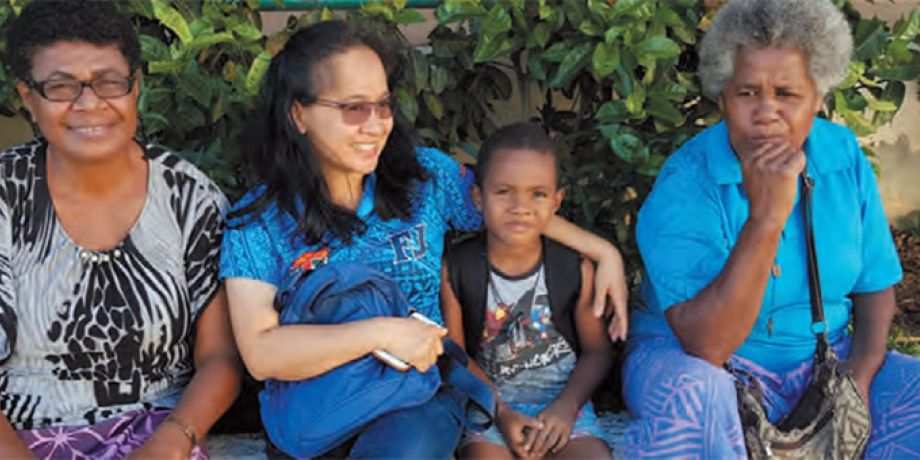
A Visit to Fiji
In 2019, I had the privilege of visiting our mission in Fiji where Columbans have ministered since 1952. Prior to visiting Fiji, I had read Fr. Frank Hoare’s account of the history of the Columban presence in his book, The Turning Wheel. In it he recalled the varied and valuable work of the Columbans and their interaction with the peoples of different cultures in Fiji over seventy years. He wrote: The story of Columban mission in Fiji has not been as dramatic as in other countries of Asia and Latin America. Fiji has not been caught up in war, extreme poverty and oppression. Yet, it has presented missionaries with the very real challenges of dealing with paternalistic colonialism, the transition to political independence, ethnic and religious pluralism, and multiple military coups-d’etat. In 1987 the army take-over of Parliament and the Government upset the peaceful way of life of the people. Differences of ethnicity, culture and religion were very real and discrimination and intolerance became commonplace. Since that time a huge effort has been made, through interfaith meetings to find ways of building respect for others. This continues today.
A Welcoming People
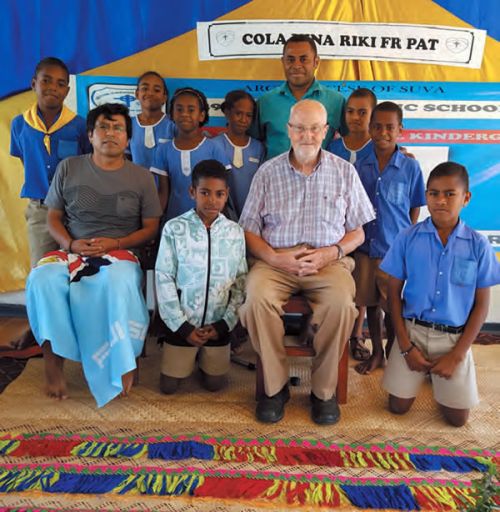
We all carry with us memories of places and countries we have visited. My one abiding memory of my visit to Fiji was the friendliness of the people and their warm welcome. During my time there I had the opportunity of spending quality time with the Columban priests, Columban seminarians, Columban lay missionaries, associate priests, office staff, teachers and parish workers who shared with me their very valuable insights into Fijian culture and the challenge of mission today. They are very much a multi-cultural group. While the number of Columbans has greatly reduced over the years, and many of the parishes have been taken over by local Fijian priests, many Columban priests are remembered with great appreciation. I had the opportunity of visiting the three parishes in Columban care, Raiwaqa, Labasa and Ba. Each of these areas are quite different.
Raiwaqa is more urban being close to Suva, the capital of Fiji. Accompanied by Columban Fr. John McEvoy, I had the opportunity in Raiwaqa of visiting a number of areas where people live in very flimsy housing and squatter-like conditions, some of which are very close to the sea and are in constant danger of being flooded during the rainy season. There is always the danger of flooding. I also had the opportunity of talking with some of the people mostly affected who shared their hopes and dreams for a better future and better housing. Sadly, after having made a down payment in a new housing development, some were ripped off and lost their deposits. It is a busy parish, but the people are very actively engaged in a variety of programs are actively supported by Columban Frs. John McEvoy and Carlo Jung. I experienced the beauty of intercultural living when sitting around the basin of yaqona listening to the people sharing their stories.
Labasa
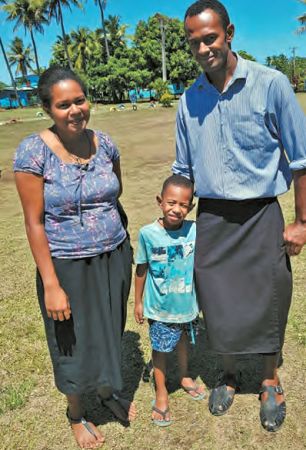
Labasa is situated in the north island, and sugar cane is the main crop. There is a big sugar mill just outside the town. I had the pleasure of spending five lovely days there with Columban Fr. JJ Ryan, my fellow county man from Limerick, Ireland, and Columban Fr. Paul Tierney. Attending the Sunday liturgy and a wedding were deeply moving. I shall treasure my visit with Fr. Paul for a Sunday liturgy in the very pretty village of Koromakawa, tucked away in the hills with some beautiful lush scenery. While it is a little remote the people were so friendly. After the Mass we all went to the local community hall where both Fr. Paul and I were welcomed with the traditional yaqona ceremony. It is not only an occasion for welcoming guests, but it is an integral part of Fijian culture. The Fijians can sit for hours drinking yaqona and telling stories. Most of the people living in the village are farmers.
The Parish of Ba
My visit to Fiji would not have been complete if I did not visit Ba parish which has had a long association with Columbans. The parish of Ba was greatly damaged a few years ago by the ravaging hurricane Winston. Even to this day one can see the effects of the damage it caused. In spite of the destruction, people have the resilience to recover from such natural disasters.
In Ba I was warmly welcomed by Fr. Nilton Iman, an associate priest from Peru, Fr. Anselmo, another associate priest from Korea, and Jinky, a Columban lay missionary from the Philippines. The welcome that I received in Ba was amazing. The people were so spontaneous in their welcome which was so genuine. It was a pleasure to meet up with Fr. Nilton and to see how deeply involved he is with the people. During my visit, there were again many yaqona drinking sessions organized. It is an acquired taste, and people were happy to see that I very much appreciated their hospitality.
Ever before I went to Ba, it was recommended that I visit the traditional Catholic village of Navala about an hour’s drive from Ba, nestled in midst of lovely mountain scenery. Here the people live in traditional homes, called bures. We had the celebration of the Eucharist with the school children followed by morning coffee and then on to the traditional bure where we were welcomed by the leaders of the community with the traditional yaqona ceremony. They live simply, but their culture and customs are very rich. I also had the opportunity to visit with Fr. Nilton the village of Votua which appropriately is dedicated to St. Columban. Here, we had evening Mass followed by the yaqona drinking ritual and a lovely meal prepared for us of delicious fish. The village of Votua is very prone to flooding during the rainy season, and many of the people are fishermen. Here I met with Gabby and his family. Gabby was a former Columban seminarian and is now married with three small children and teaches in the local school. On the following morning we were once again given the traditional welcome by the teachers and the school children. I shall remember with gratitude the deep warmth and welcome of the people of Ba, Labasa and Raiwaqa.
Wonderful Singing
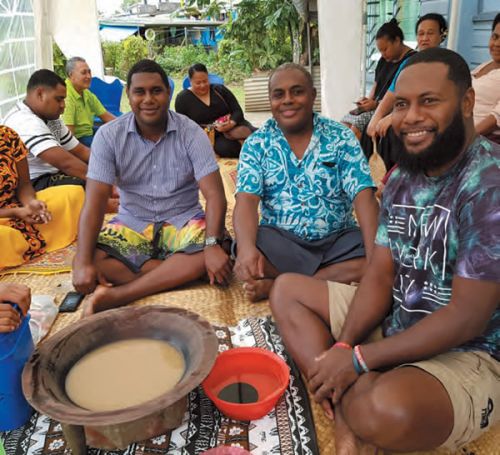
One of the abiding memories that I took away with me was the beautiful singing in perfect harmony in each place I visited. One of the greatest gifts of the Fijian people is their singing. One could sit for many hours listening to them. Their liturgy celebrations are fully alive.
Sacred Moments
I experienced a number of very sacred moments during my time in Fiji, most notably a visit with Fr. John McEvoy and Naomi to the Cemetery in Suva. Here we visited the graves of Columban priests who were buried there, Dermot Hurley, Jim Rathbun, Arthur Tierney and Columban lay missionary Elizabeth Lim Yean Sin from Korea who died at a very young age.
In the very tranquil and peaceful surroundings we also prayed in thanksgiving for Columban Fr. Richard Keelan buried in Lautoka and Columban Fr. John Mahoney buried in Naililili. As we sat by the graves, we also remembered the names of all the Columbans who worked in Fiji over many years and who are buried elsewhere, including Columban lay missionary, Serafina Ranadi Vuda.
We gave thanks to God for their contribution to Columban mission in Fiji and the many ways in which they touched the lives of the Fijian people as well as being touched by them. Their memory will continue to live on. On a number of occasions, I met people, who on learning that I was a Columban, recalled with great affection many Columbans whom they met over the years.
Plastic Paradise
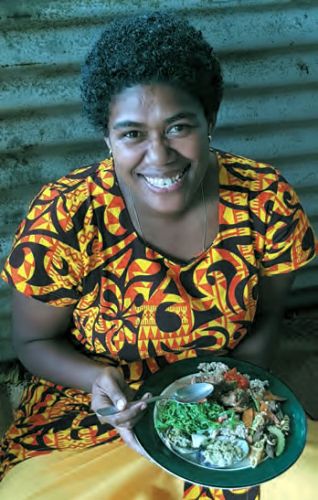
Fiji is renowned for its beautiful beaches, pristine blue waters and stunning sunsets. Each year, many tourists come to Fiji to enjoy the sun, sea and vibrant hospitality. I happened to be in Fiji during the special month of Creation. Like many other countries, the reality on the ground is starkly different.
The paradise picture we have of Fiji is beginning to sink under tons of rubbish carelessly thrown away. During my many walks along the beautiful seafront in Suva. I observed a lot of rubbish being washed ashore including various shapes of plastics. Many people do not even stop to think twice about littering. This is not only true of Fiji but also is endemic in many countries including Ireland.
Sadly, we are still on a learning curve when it comes to the ways in which human activity continues to pollute the environment. Fiji is a small nation surrounded by water. Unfortunately, plastic and other pollutants which are not disposed of properly on land, make their way out into the oceans, and Fiji is no exception.
Thankfully, there is a growing awareness among people for the need to radically protect the environment and our planet. The people of Fiji, through their interfaith search with peoples of other religious traditions, are working together to highlight the dire consequences to the environment that pollution in its many varying forms is causing.
The parishes are taking very concrete actions in being proactive in coming together to clean the beaches and their environs. The Columban seminarians, lay missionaries and parishioners are playing their part in cleaning the beaches in Suva and other areas of litter that is not only a health hazard but also is detrimental to the environment. They have taken very seriously the theme for the Season of Creation, on the Web of Life. The month was a worldwide celebration of prayer and action to protect our common home where we share a common role as stewards of God’s creation.
We are part of a single, wondrously complex web of life that is woven by God. Pope Francis wrote in Laudato si', “Human beings, while being capable of the worst, are also capable of rising above themselves, choosing again what is good, making a new start.”
The various faith communities in Fiji, young and old alike, are to be commended and congratulated for their efforts in coming together to clean up around their own homes, communities and along the seafront and beaches. At every level whether in Fiji or elsewhere, more community awareness needs to be created through church and interfaith workshops.
An Enriching Visit
My visit to Fiji was short but very enriching. The faith of the people is very vibrant and many groups are taking the challenge of Pope Francis on the environment very seriously. Spending quality time with the Columban community, lay missionaries, seminarians and parishioners and listening to their stories deepened my own faith and commitment as a Columban missionary. I experienced not only a great welcome but also a great vibrancy and zest for life among the Columbans and the people. I am indebted to so many who made my visit so enriching.
Columban Fr. Patrick Raleigh lives and works in Ireland.